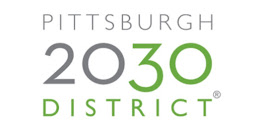Organized by the Pittsburgh-based Green Building Alliance, the Pittsburgh 2030 report acknowledged the impacts of the COVID pandemic on the partners involved in this initiative and how they had to pivot to meet the challenges of the pandemic.
In 2020, the Pittsburgh 2030 District reduced energy usage to 28.9 percent below the baseline, an improvement from 23.1 percent in 2019.
Property partners purchased over 196,000 MWh of off-site renewable energy, representing 6.7 percent of all energy used. The purchase of renewable energy avoided 20,000 metric tons of carbon emissions.
2020 proved to be an important year for renewables, with many Property Partners making significant commitments to reduce fossil fuel usage.
Higher education was a champion of clean energy.
The University of Pittsburgh revealed its plan to purchase a 20 MW solar array to cover 13 percent of its power needs, and the Community College of Allegheny County finished a new 540 kW array on its North Campus in 2021.
The City and its partners in the Western Pennsylvania Energy Consortium signed a 12-month agreement to purchase 100 percent renewable electricity for its members.
Continuing regional investments in renewables, Allegheny County entered into a power purchase agreement with Rye Development to purchase 7.4 MW of electricity from a proposed hydroelectric facility at the Emsworth Dam.
Financial institutions also played a large role in clean energy.
PNC Financial Services renewed its commitment to purchase 100 percent of its electricity from renewable sources by 2025 and to provide financing for solar and wind projects. Similarly, BNY Mellon pledged to reduce its greenhouse gas emissions by 20 percent from a 2018 baseline by 2025.
Click Here to read the entire report.
There are also 2030 Districts in Erie and Philadelphia.
For more information, visit the Green Building Alliance’s Pittsburgh 2030 District webpage.
Related Article:
-- Pittsburgh Green Building Alliances Hosts June 11 Women+ In Green Steadfast & Strong Breakfast
[Posted: May 24, 2021] PA Environment Digest

No comments :
Post a Comment